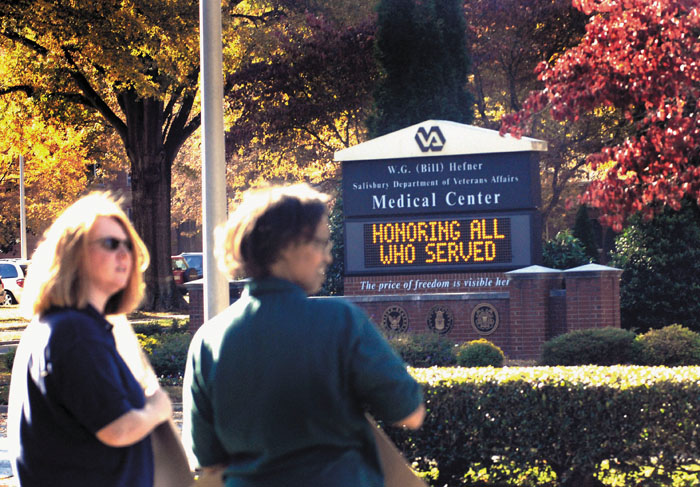Report recommends ceasing some services, constructing new clinic at Salisbury VA
Published 3:21 pm Friday, March 18, 2022

- Wayne Hinshaw / Salisbury Post file photo Employees are seen in front of the entrance sign to the Hefner VA Medical Center in a 2008 file photo. The government shutdown has not affected daily operations at the Hefner VA Medical Center.
SALISBURY — A new federal market assessment of Veterans Affairs facilities across the nation recommends changes at Salisbury’s W.G. (Bill) Hefner VA Medical Center, including the discontinuation of some services and a new outpatient clinic.
In June 2018, former President Donald Trump signed into law bipartisan legislation called the Mission Act that aims to expand veterans’ access to health care. The legislation allows them to seek community care if there’s no local VA facility or a facility is unable to provide the services needed. Updates to the law made in 2019 provide veterans with certain urgent care benefits outside of VA facilities.
Another provision of the Mission Act was to conduct a market assessment every four years. This year marks the first Asset and Infrastructure Review for all VA facilities across the nation. The goal of conducting the report and making recommendations is to invest in employees, modernize health care delivery and leverage health care partnerships.
Assessments factored into the report include the markets’ geography, demographic, supply and demand, quality, satisfaction, facilities and cost. The findings resulted in a 10,000-page report with 1,700 potential recommendations. Those were submitted to the leadership of the U.S. Department of Veterans Affairs, which made recommendations to a newly established commission this month.
Overall, the report found that the median age of VA hospitals across the nation is 58 as many were built throughout the 1940s and ’50s for World War II veterans. Salisbury’s site, located at 1601 Brenner Ave., opened its doors in 1953 and is the headquarters of a system that includes sites at Kernersville and the south and north Charlotte areas. The VA includes the Veterans Health Administration, the Veterans Benefits Administration and the National Cemetery Administration.
The report shows $163 million in deficiencies at the Salisbury site, with annual operations and maintenance costs of $11 million.
The report states that the recommendations affecting Salisbury are intended to maintain inpatient mental health and community living center services while modernizing and expanding residential rehabilitation treatment program services.
The first recommendation is to establish a strategic collaboration for inpatient medical, surgical care and emergency department services, meaning such services would be discontinued at the Salisbury site. The recommendation calls for establishing a partnership with an academic affiliate in Charlotte to deliver those services. The market assessment shows a 71% occupancy rate for such services at 3-star facilities within a 60-minute drive of Salisbury, leaving enough room to absorb Salisbury’s volume.
“It relocates the low-volume program at the Salisbury VAMC to a strategic collaboration with the academic affiliate and their partner hospital, which will allow VA providers to deliver acute care services in Charlotte, North Carolina, closer to where veterans live,” the report states.
That recommendation comes from a projected decrease in the total inpatient medical and surgical care demand at the Salisbury VAMC.
“The Salisbury VAMC has had difficulties in recruiting and retaining providers,” the report states. “There is high-quality care in the Salisbury, North Carolina, area.”
Another recommendation is to relocate outpatient surgical services to the Kernersville and Charlotte sites and convert the existing emergency department to an urgent care center. However, the report calls for establishing a new community-based outpatient clinic that would allow the Salisbury site to maintain access to primary care, outpatient mental health, outpatient specialty and urgent care services.
These recommendations result from the projected demand in the market by 2029. Findings show acute inpatient medical and surgical services is projected to decrease by 7.8% and demand for inpatient mental health services is projected to decrease by 3.5%. Demand for long-term care is projected to increase by 22.5%, while demand for all outpatient services — primary care, mental health, specialty care, dental, rehab therapies — is projected to increase.
“These market recommendations are just that — recommendations,” said interim Salisbury VA Health Care System Director Ronald Johnson. “Right now it’s too early to tell how they could affect our health care system. Should they be approved, these changes could take years to implement.”
The AIR commission will review all recommendations until March 2023. During that time, there will be public hearings and visits to VA facilities. The commission must then submit final recommendations to President Joe Biden with any changes they deem necessary. Biden will then have until the end of March to approve or disapprove before it goes to Congress for review in May and June. So, it’s possible presidential and congressional recommendations may look different than what’s currently being proposed.
The U.S. Department of Veterans Affairs will then begin prioritizing plans, which are expected to span over the next 20 years.
VA spokesman Todd Goodman told the Post that VA services aren’t leaving the market, but “the market may look different.”
The Salisbury site served 77,742 veterans throughout 2020-21, while the Charlotte branch served 40,022 and Kernersville served 37,101 during that same time period.
To view the report, visit www.va.gov/AIRCOMMISSIONREPORT/Volume_II.asp. Salisbury is located in the southwest market of Veterans Integrated Services Network 6. The southwest market includes all of western North Carolina.





